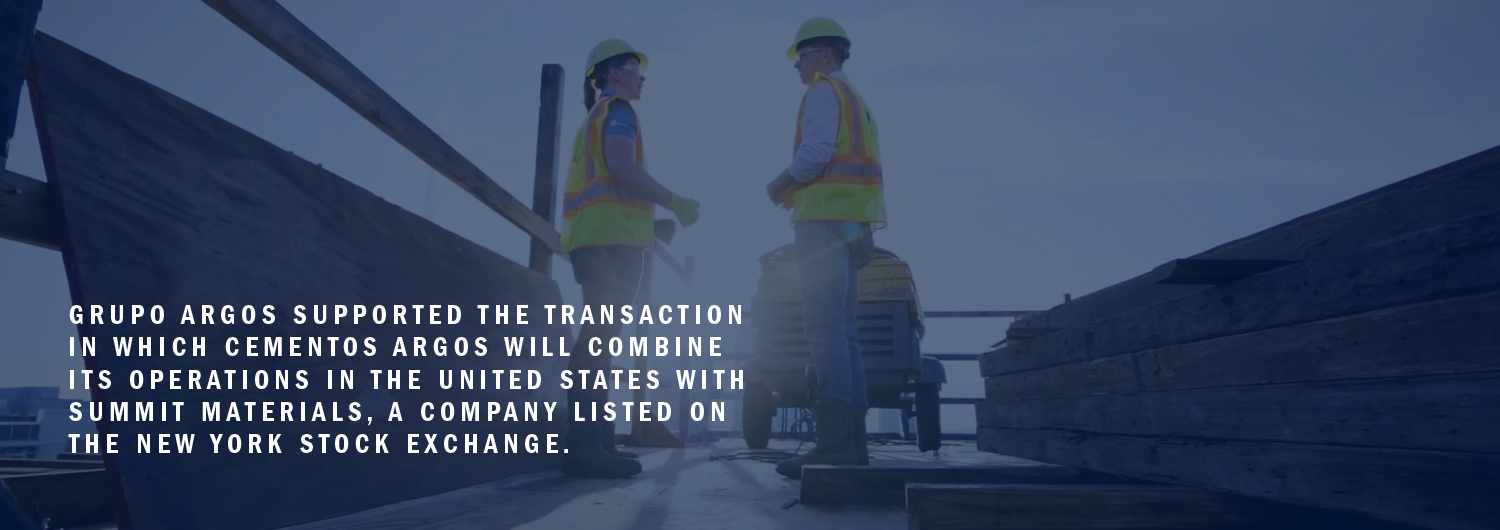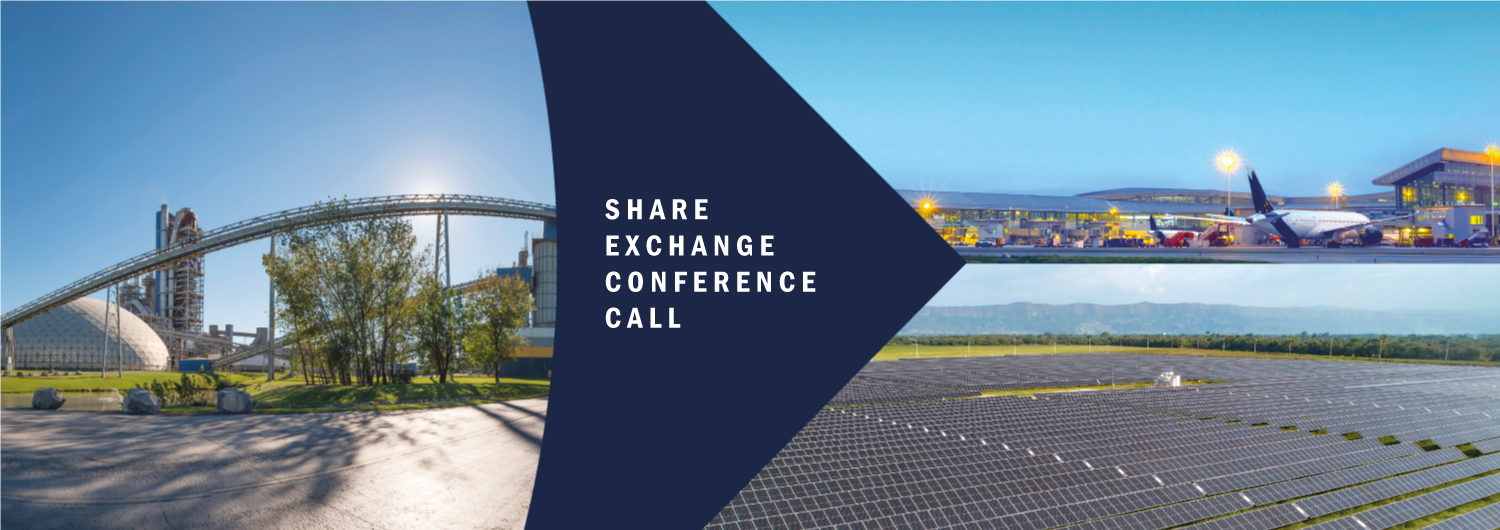
Transactions and strategy
Learn about the plan that our business group has drawn up to continue being a leading holding company in the American continent.
Combination of Argos USA and Summit Materials
Grupo Nutresa share exchange
Our strategy
Our strategy focuses on achieving a sustainable growth of our investments and creating value for all our stakeholders. To achieve this, we have four pillars we focus our work on.
- An efficient allocation of capital to make investments, thus seeking to optimize the return-risk ratio.
- The application of high Corporate Governance standards.
- We take responsible action with the societies where we are present.
- An appropriate management of human resources in the entire organization.
During 2020, we adjusted our vision for the future and identified an opportunity to position Grupo Argos as an infrastructure asset management recognize throughout the region for its capacity to grow and develop attractive and profitable platforms for long-term institutional investors and realizing shared value generation amongst our different stakeholders.
Grupo Argos has defined 2 strategic objectives to prioritize the initiatives we pursue and achieve our vision of the future:
1. Selective and Profitable Growth: Growth that focuses on essential assets within the region’s infrastructure grid, contributing to the development and competitiveness of the Americas.
2. Value Maximization: By strengthening returns on investments with a long-term vision, leveraged by the operational excellence of our businesses.
Our strategy is framed by 6 key pillars or drivers that support Grupo Empresarial Argos in the execution of its vision for the future. Through these differentiated yet interdependent value drivers, we elevate the strategic options of our business and strengthen the fundamentals that define us as a Corporate Group, making this a solid and competitive corporate block.
1. Strategic Oversight: Empowering Corporate Group strategies with our expertise, cross-cutting understanding, and long-term vision, as well as our capacities for promoting new perspectives and synergies amongst the businesses. Through the joint work done between Group Argos, the boards of directors and the management of each company, we participate in the strategic decisions made by our businesses and assist with their disciplined implementation.
2. Financial Management: We manage our investment portfolio through adequate resource assignment and an efficient capital structure throughout the companies that make up our Corporate Group.
3. Ethics and Corporate Governance: We ensure our businesses have an impeccable Corporate Governance System. Corporate Governance and Compliance systems define and set the ethical, behavior and transparency standards that govern our directors, managers, and employees.
4. Sustainability Vision: We transfer, in turn, our conviction for conscious investment, responsible operations, and the implementation of cutting-edge practices, aiming to have a positive and sustainable long-term impact.
5. Identity and Engagement: Our extensive history has allowed us to build a solid identity and an extensive engagement network that allow our companies to participate in important investments and attract low-cost capital, new strategic partners, and the best human talent.
6. Talent and Culture: A set of initiatives that seek to attract, develop, and retain the best talent, within the framework of the pillars of transcendence, integrity, inspiration, and commitment that make up the culture of our Corporate Group. It is precisely that talent, alongside our Group Culture, which enables effective performance of all our capacities and consolidation of our human and intellectual capital. This is why we focus on attracting, developing, and retaining it for the entire Corporate Group.
Our Materiality Analysis is the roadmap that reflect our most important areas of work on environmental, social, and governance (ESG) issues, which allow us to adapt to changes in our context, market dynamics, and stakeholder expectations. The level of relevance of the topics developed under this heading precisely reflect the six issues that we consider our key value drivers.
The final result provides us with a roadmap that allows us to focus our resources on topics that are relevant to all while guaranteeing an alignment between material topics and Grupo Argos’s strategic framework.
We used a five-step prioritization process to define our material topics, as follows:
1. Identification of material topics: We drew up an initial list of topics using external sources as a starting point, including the Sustainable Development Objectives, global trends, and different sustainability frameworks and standards. We also used internal sources including our strategy, risks, policies, among others.
2. Identification of stakeholders for consultation: We performed an analysis to define suitable methods and key actors for consultation, who represent our prioritized stakeholder groups.
3. Prioritization: Inputs obtained in the previous stages enabled scoring and assigning priorities to each topic that we identified as requiring active management.
4. Internal and external consultations: We held open interviews with each stakeholder group, who asked questions and identified topics that could impact them.
5. Validation: We submitted and validated our preliminary results to and with upper management and our Board of Directors.
Grupo Argos is leveraged by its 4 main governance bodies to guarantee active participation in its investment strategies, from design to implementation.
1. Board of Directors and supporting committees: Our Board of Director defines corporate strategy, oversees management activities, and monitors economic, environmental, and social risks and opportunities that arise.
2. Grupo Argos Steering Committee: Led by Grupo Argos’s CEO and VPs. Responsible for recommending corporate strategy and making sure that business strategies are aligned with Grupo Argos’s vision for the future.
3. CEO Committee: Based on in depth knowledge of each strategic business, this Committee discusses decisions that encompass the entire corporate group and articulates joint efforts. The CEOs of the businesses are fully responsible for the results of each company, under the direction of their corresponding boards of directors, and within the framework of the Grupo Empresarial Argos corporate context.
4. Strategy Committees: Per-business committee responsible for analyzing and prioritizing growth initiatives, aiming to reflect the vision for the future in concrete growth, investment, or divestment initiatives.
Grupo Argos participates in highly regulated businesses, including energy and highway and airport concessions. Thus, within our strategic risk map, we prioritize initiatives that seek to reduce political, economic, and regulatory uncertainty amongst our businesses as follows:
1. Teams specializing in regulations within each operational business.
2. We exercise leadership within different Associations to build proposals in industry groups and think tanks, share best practices, discuss new regulation, and seek to strengthen alliances.
3. As regards the Authorities, we assist the National Government in the construction of cross-cutting public policy for the collective benefit and a joint socialization of new projects and initiatives that aim to care for the Environment and meet the 2030 Agenda and its SDGs.
Building capacities and digital platforms as vehicles for innovation in our businesses is part of our DNA. This is why we have talent specializing in data science, innovation, and automation in all the Group’s businesses, that work towards process optimization and digital innovation.
This digital vision of the corporate group is consolidated through Summa -our shared services center- where we have enabled capacities for emerging technologies and accompany the businesses’ digital strategy. Through Summa, as the enabler of digital transformation, we articulate and implement initiatives that aim to improve process efficiencies, reduce transaction costs, and respond to the needs of the clients of each business.
Summa’s role as digital transformation enabler has the following scope:
1. Be leveraged by technological solutions for process improvement.
2. Act as an active technological curator to bring in cutting edge technologies and place them at the service of the businesses.
3. Enter into partnerships with global technology referents like Google, Amazon, SAP, IBM, Microsoft, Oracle, and Cisco, among others, to incorporate and have available the technological capacities each of them offers.
4. Permeate the framework for action with integrity and reliability through a cybersecurity.
Summa has approximately 100 experts on digital topics, with skills in the areas of robotics, data science, artificial intelligence, cloud computing and machine learning, among others. Besides, each business has its own teams of experts who focus on leveraging digitization (through analytics, the Internet of Things, automation, and data science) to satisfy their needs and maintain operational excellence in business.
Our Risk Management Policy and Handbook covers crisis management. This is done through a specialized team exclusively dedicated to the strategic management and proactive monitoring of risks that could be realized and translate into crises. This allows us to define concrete action plans based on a comprehensive reading of our environment and helps with impact mitigation through the implementation of controls and actions supervised by different organizational instances starting with the Board of Directors. Risks are analyzed both at the Corporate Group and at the Holding level.
With regards to the realization of potential crises, we have structured specific committees that design emergency plans to rapidly attend to, mitigate, and manage impacts. These committees are Ad Hoc and circumstantial and usually have participation from the Corporate Group CEO, the steering committees, the institutional engagement and communications area, and the operating teams that must be present due to the nature of the event.
We maintain open, close, and transparent communications with our different stakeholder group to keep them properly informed about potential organizational impacts and situations that could translate into crisis situations.
Using the crisis generated by the coronavirus during 2020 as an example, the following highlights of the initiatives promoted by Grupo Argos to deal with the crisis:
1. Creation of working committees to follow up and manage the situation (e.g., Steering Committee, CEO Committee, Risk Manager Meetings, etc.)
2. Design and activate business continuity plans and operating protocols.
3. Updated risk quantification scenarios and recovery trajectories.
4. Liquidity management and capital structure to guarantee financial flexibility.
5. Ongoing reports on the evolution of the situation (e.g., COVID-19: infections, mortality, vaccination, and markets).
6. Accompaniment for employee health and well-being
7. Insurance program activation.


